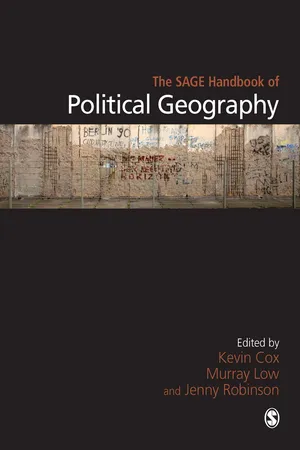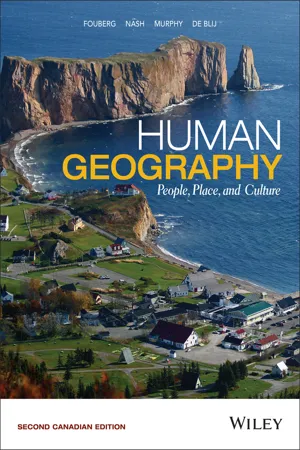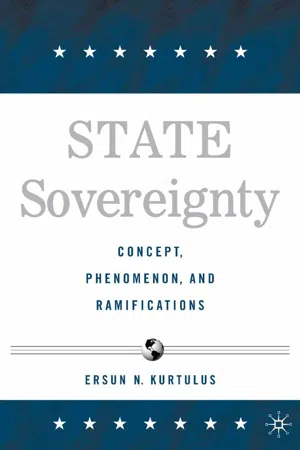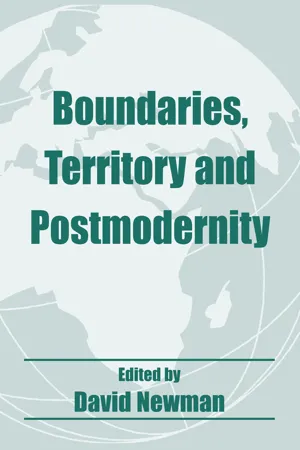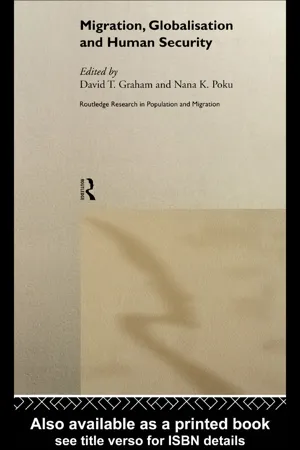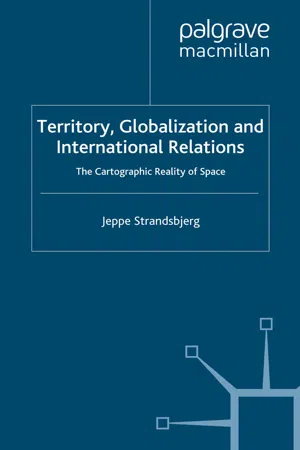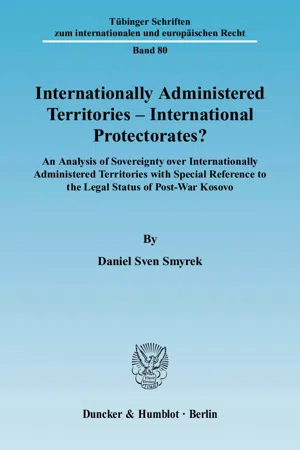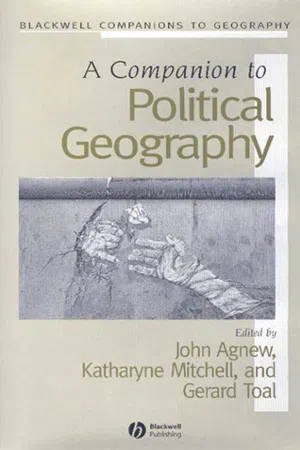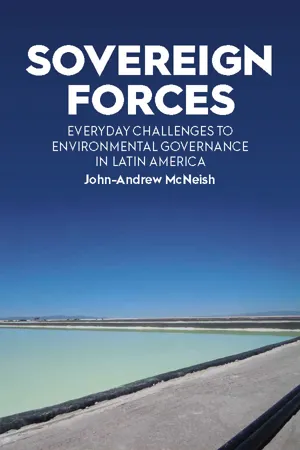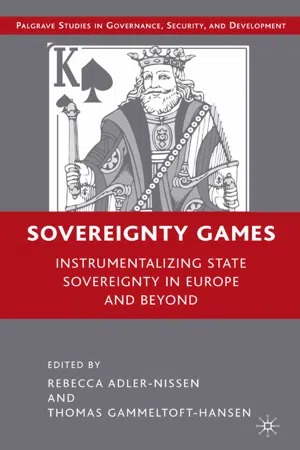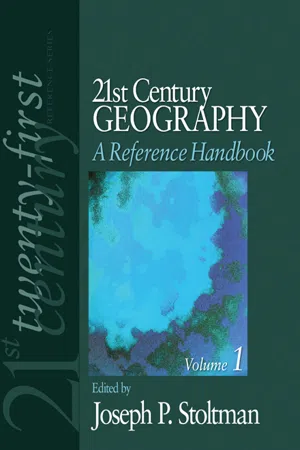Geography
Sovereignty
Sovereignty refers to the supreme authority and power of a state to govern itself and make decisions within its own borders without external interference. It encompasses the state's control over its territory, people, and resources. In geography, sovereignty is a key concept for understanding the political and territorial dynamics of states and their relationships with other entities.
Written by Perlego with AI-assistance
Related key terms
1 of 5
11 Key excerpts on "Sovereignty"
- eBook - PDF
- Kevin R Cox, Murray Low, Jennifer Robinson, Kevin R Cox, Murray Low, Jennifer Robinson(Authors)
- 2007(Publication Date)
- SAGE Publications Ltd(Publisher)
5 Theorizing the State Geographically: Sovereignty, Subjectivity, Territoriality M e r j e K u u s a n d J o h n A g n e w INTRODUCTION The spatiality of state formation and administration is a central theme in political geography. Within this scholarship, the present chapter focuses on the concept of Sovereignty as the presumably consti-tutive characteristic of the state and the apparent foundational principle of the state system. It is in relation to Sovereignty that other crucial concepts – like power, authority, community, and obligation – have acquired their present meaning (Walker, 1993: 164). The chapter takes the pivotal importance of Sovereignty to contemporary understandings of the state – and politics more generally – as its start-ing point. It foregrounds the conceptual premises of the traditional debates on Sovereignty, and it highlights key strands in the recent rethinking of these premises. It bypasses as inherently problem-atic theoretically the familiar questions about what is the role of the state in world politics or whether the state is withering away. It instead examines the unspoken assumptions that make it possible to discuss the state in terms of its capacity to act and control territory. In so doing, it disen-tangles Sovereignty, subjectivity, and territoriality, and identifies avenues for a more flexible concep-tualization of agency and spatiality in the state system. This, we hope, offers insights not only into the domain of state authority, but into the spatial operations of power more broadly. The presentation proceeds in three steps. The first section ‘State Sovereignty as social construct’ highlights the central, if problematic, role of the principle of Sovereignty in the fields of international relations and political geography. - eBook - PDF
Human Geography
People, Place, and Culture
- Erin H. Fouberg, Alexander B. Nash, Alexander B. Murphy, Harm J. de Blij(Authors)
- 2015(Publication Date)
- Wiley(Publisher)
Central to the idea of the state is the concept of terri- toriality, which geographer Robert Sack (1986) defines as “the attempt by an individual or group to affect, influence, or control people, phenomena, and relationships, by delimiting and asserting control over a geographic area.” Sack sees human territoriality as a key in- gredient in the construction of social and political spaces. He argues that human territoriality takes many different forms, depending on the historical, social, and geographical context. We need, he suggests, a better understanding of the human organization of the planet through a consideration of how and why different territorial strategies are pursued at different times and in different places. Political geographers study territoriality across scales, cultures, and histories. They examine how people have changed the way territo- riality is expressed and how ideas about territoriality vary over space and time. Today, territoriality is tied closely to the concept of Sovereignty, which refers to a state’s right to exercise power and control over people in a particular territory, a right that is recognized in international law. The UN principle re- quiring the international community of states to recognize an entity as a legitimate state and as being sovereign within its bor- ders stems from the concept of territoriality. Sometimes states will refuse to recognize other places that claim to be states in their own right. For example, territoriality has led to the heavy contestation of space in the former Yugoslavia. The Republic of Kosovo declared independence on February 17, 2008. By July 2014, some 107 of the 198 member states in the United Nations (including Canada, the United States, Australia, and most of the European Union) recognized Kosovo as a sovereign state. However, many states did not, in- cluding Serbia and Russia (Figure 3.5). - eBook - PDF
State Sovereignty
Concept, Phenomenon and Ramifications
- E. Kurtulus(Author)
- 2005(Publication Date)
- Palgrave Macmillan(Publisher)
However, this does not mean that the issue under consideration is completely uncontroversial. It is indeed the case that juridical sover- eignty is sometimes conceptualized in quantitative terms when the word “Sovereignty” is perplexingly used in the legal context to designate some- thing other than a specific subject status or legal standing, namely, when it is used to refer to the consequences that follow from such a condition. This is a mode of usage that seems to be more common among interna- tional lawyers than students of other disciplines. 42 For instance, it has been asserted by Ingrid D. De Lupis, in the context of an analysis of Sovereignty of States and Similar Entities ● 69 “territorial Sovereignty” that A state’s territorial Sovereignty may be restricted in two ways under general international law: there are restrictions which relate to the terri- tory itself, or to the environment—for example, certain rights of transit and a duty to refrain from pollution—and there are restrictions which relate to individuals residing in the territory, for example immunity of state agents and human rights. 43 The method by which territorial Sovereignty may be restricted is not merely through the conclusion of treaties: there may be rules of general international law or local custom that impose limitations on the action of a state in its own territory. 44 Now, to the extent that these or similar statements refer to attempts at regulating, by means of a set of norms, the behavior of states and similar entities at the interstate level, they do not contradict the view proposed earlier that juridical Sovereignty, referring as it does to a legal status, is an absolute and qualitative property. - eBook - ePub
- David Newman(Author)
- 2013(Publication Date)
- Routledge(Publisher)
From a legal perspective, state Sovereignty continues to apply within the demarcated, and recognised, boundaries of the State while, at the same time, Sovereignty may also be expressed through some form of de facto control – which may be either territorial or expressed through virtual communities – as contrasted with de jure international recognition. This has been described as constituting ‘nominal’ Sovereignty, 39 dealing directly with the exercise of power, deriving from the German doctrine of Gebietshoheit. For geographers, the idea of nominal Sovereignty may be seen as a modern version of the notions expressed some sixty years ago by Derwent Whittesley in his study of the impress of effective authority upon the landscape, 40 or 25 years ago in David Knight’s study of the impress of authority and ideology upon human territories. 41 At the same time as boundaries are becoming more permeable to the movement of goods and people, and diffusion of ideas and transactions, the fences of national and ethnic separation continue to be erected in other parts of the world. The re-emergence of nation states in the wake of the collapse of the Soviet Union, the redrawing of the lines of separation between the Czech republic and Slovakia, and the desire for clearly defined separate national territories on the part of Bosnians and Croats, Israelis and Palestinians, Turkish and Greek Cypriots, to name but a few, are indicators of the continued power and importance of territorial lines. The desire for self-government and independence are tied up with the concrete formation of national identities and the way in which these are linked to the territorial demarcation of national homelands, as reified in the socialisation processes of these same groups - eBook - ePub
- David T. Graham, Nana K. Poku, David T. Graham, Nana K. Poku(Authors)
- 2005(Publication Date)
- Routledge(Publisher)
4 Mapping Territoriality The Geopolitics of Sovereignty, Governance and the Citizen Peter Marden In the present era of international politics, whether one refers to it as belonging to the vagaries of globalisation or some postmodern domain, there seems to be an intellectual obligation to revisit critically some long-held cherished assumptions about politics and society. Indeed, to suggest that the territorial boundaries of states are no longer commensurate with political authority and absolute control is hardly innovative. Nor is it necessarily startling to recognise the growing network of non-state organisations exercising levels of influence over states and national policy-making agendas. If anything, the literature on globalisation has at least brought this to our attention. But to what extent has some of the language and conceptual iconography usually associated with a state-centred polity come under serious scrutiny? Notions of difference, ethnicity and the cultural realm of identity politics have all surfaced as essential features of the contemporary international political landscape. This is not surprising when one considers the diverse and powerful responses to the dimensions of international migration. Indeed, the accommodation of cultural differences is becoming a real test of tolerance for some communities. But what impact are these events and recognitions having on hitherto unproblematised conceptualisations of territoriality and Sovereignty? This chapter will examine how broader understandings of territoriality and Sovereignty will help us come to grips with what many have called postmodern world politics. Rather than rallying around the call for the ‘end of geography’ this analysis will affirm the imperative of geography, but only through a redefinition of these foundational terms. By adopting a broader perspective on these terms, the issues surrounding the nature of governance and the challenges to the state also become clear - eBook - PDF
Territory, Globalization and International Relations
The Cartographic Reality of Space
- J. Strandsbjerg(Author)
- 2010(Publication Date)
- Palgrave Macmillan(Publisher)
And to understand this, we must not only think in terms of territorializing the state and Sovereignty but investigate a broader notion of spatial change that includes a notion of globalization preceding or co-occurring with the formation of territorial states. Focusing on the relationship, then, between territory and the state, it is useful to be reminded of Jean Gottmann’s seminal work The Significance of Territory, where ‘territory appears as a material, spatial notion establishing essential links between politics, people, and the natural setting’ (1973: ix). In his view, territory is significant ‘as the unit in the political organization of space that defines, at least for a time, the relationships between the community and its habitat on one hand, and between the community and its neighbors on the other’ (Gottmann 1973: ix). The link between territory and Sovereignty is essential but also one that is changing over time as ‘the basis for the enforcement of the law subtly shifted from allegiance to a personal sovereign toward controls exercised by the sovereign power in geographical space. The partitioning of space thus acquired an increasing significance, and ter- ritorial Sovereignty became an essential expression of the law coinciding with effective jurisdiction’ (Gottmann 1973: 4). The significance of ter- ritory, then, lies in the spatialization of state Sovereignty that served as a basis for the conceptualization of international politics as something taking place between spatially differentiated but similar (in that they are sovereign) entities. This has been the self-understanding of the IR disci- pline, where the peace treaties of Westphalia are seen as the foundation of modern IR (Walker 1993). And it is important to recognize this while at the same time remembering that territory has much wider meaning and the understanding of political space should not be limited to simply territory. - eBook - PDF
Internationally Administered Territories – International Protectorates?
An Analysis of Sovereignty over Internationally Administered Territories with Special Reference to the Legal Status of Post-War Kosovo.
- Daniel Sven Smyrek(Author)
- 2011(Publication Date)
- Duncker & Humblot(Publisher)
Hence, from the perspective of each territory, the question of who holds Sovereignty over such territory, can be raised (i.e., the issue of territorial Sovereignty). Logically, this question can also be viewed from the perspective of each state: is this particular state the (territorial) sovereign over this particular territory? Even a negative answer would not automatically exclude such state from being sovereign. The impact of a formal and a material notion of sover-eignty on the meaning of territorial Sovereignty will be analysed below. 38 B. The Notion of “Sovereignty” 71 Cf. advocates of a liberal constitutional law, e.g. Waitz, Grundzüge der Politik, pp. 162 et seq.; von Mohl, Das Deutsche Reichsstaatsrecht, pp. 29 et seq.; with further references: Oeter, loc. cit. , pp. 667 et seq. 72 Oeter, loc. cit. , p. 675. 73 Cf. e.g. Böckenförde, Demokratie und Repräsentation, pp. 40 et seq. 74 See already Madison, The Federalist No.46. 1. The Term “Territorial Sovereignty” as Departing from the Formal Concept of Sovereignty The formal, abstract notion of Sovereignty has affected the definition of territor-ial Sovereignty 75 . As a result, territorial Sovereignty is widely regarded as title (under international law) to a territory, conferring the right to dispose of such terri-tory by means of a treaty, regardless of actual exercise of power within the state territory. Also, it does not necessarily include actual supremacy over a territory 76 . Another significant aspect of the formal, abstract notion of territorial Sovereignty, may be seen in the widely accepted premise that territorial Sovereignty requires the element of intent 77 . Absent this animus of Sovereignty ( animus possidendi, animus occupandi ), it is not possible to assume territorial Sovereignty of [a] state(s) over a geographical area, even though actual state control in the relevant territory might be exercised by this state / these states 78 . - eBook - PDF
- John A. Agnew, Katharyne Mitchell, Gerard Toal, John A. Agnew, Katharyne Mitchell, Gerard Toal(Authors)
- 2008(Publication Date)
- Wiley-Blackwell(Publisher)
Yet despite this problematization of ``centered'' accounts of political power in each of the above adaptations, geography, arguably, is still assumed to have less to do with the way that power works over space than does politics. Ultimately, it seems that notions of Sovereignty, hegemony, domination, coercion, discipline, authority, surveillance, as well as political rule, organization, and administration, comprise the core vocabulary of power for many within political geography . Whereas distance and proximity, diffusion, and distanciation, or even territory and scale, make up the supporting glossary ± if not the backcloth to power, then part of its rich texture ± as if space makes little difference to the way that power works (see Allen, 2002). This is obviously a contentious claim and one likely to be disputed, whereas the claim that an instrumental conception of power predominates in much of the political geography literature is likely to prove less controversial. For the sense in which power acts as a constraint, an instrument of domination rather than an enabling force, runs through a great number of international relations, world systems, critical geopolitics, and political geography tracts. This is neither altogether surprising, nor wrong in essence, but it is partial. From the work of Hannah Arendt, but also from Michel Foucault, it is possible to see how an alternative understanding of power, one based upon enablement and association, can help us understand the political landscape in different ways. Such an understanding may lend itself to an explanation of the mobilizing actions of NGOs or protest movements in general, but it is by no means restricted to such accounts. BIBLIOGRAPHY Agnew, J. 1994. The territorial trap: the geographical assumptions of international relations theory. Review of International Political Economy , 1(1), 53±80. Agnew, J. 1999. Mapping political power beyond state boundaries: territory, identity, and movement in world politics. - eBook - PDF
Sovereign Forces
Everyday Challenges to Environmental Governance in Latin America
- John-Andrew McNeish(Author)
- 2021(Publication Date)
- Berghahn Books(Publisher)
This is a debate that will be revis-ited in Chapter 4. For now, it is important to signal that territorial thinking, the production of territories and the employment of territorial strategies are bound up with constituting Sovereignty. Indeed, they are both ways of main-taining power or with resisting the imposition of power by a dominant group. Moreover, forms of exclusion can be consolidated and reinforced through territorial practices, yet they can also be resisted through similar means. Evidence of the relationship between different understandings of territory and resources, and competing expressions of state, corporate and popular Sovereignty is visible not only in recent academic research, but also in the slogans, statements and actions of social movements. These movements rep-resent not only indigenous communities, but also a coalition of marginalized interests (caused by different settler histories) in which alliances have been formed between indigenous, smallholder, landless and peasant communities. It is perhaps important to stress here that as a result of political histories in which indigenous peoples were rebranded with the class identity of peasant communities, it is often not possible or even correct to distinguish clearly between these social sectors. Class and ethnicity have become bound together throughout Latin America. This is particularly the case in Bolivia, as a result of its conjoined histories of resource extraction and revolution. 6 Sovereignty within and beyond the State • 71 The international food Sovereignty project emerged in the 1990s in re-sponse to the rapid expansion at the time of the corporate food regime and related moves by wealthy countries to acquire great tracts in the Global South to feed their current and prospective growth. - eBook - PDF
Sovereignty Games
Instrumentalizing State Sovereignty in Europe and Beyond
- R. Adler-Nissen, T. Gammeltoft-Hansen, R. Adler-Nissen, T. Gammeltoft-Hansen(Authors)
- 2008(Publication Date)
- Palgrave Macmillan(Publisher)
According to Neil Walker, the conceptual duality of the term sover- eignty sketched out above is key to understand its present value in artic- ulating and framing existing power relations in the transitional stage between a Westphalian and a post-Westphalian order (N. Walker 2003, 19–23). In the former order claims to authority are made strictly within a statist structure, whereas in the latter sovereign power is increasingly asserted along functional boundaries crosscutting the territorial division of the Westphalian map. (ibid., 22). The latter may be observed not only in the emergence of functionally limited polities, such as the EU, coexist- ing within the same territorial space as its constituent national sovereign member states, but also in the growing emergence of cooperative legal frameworks between EU or member states and third countries effectively extending sovereign functions beyond EU borders. Yet, despite these functional assertions of power, the Westphalian order is not rejected in favor of a new framework for Sovereignty, rather the territorial or national conceptualization of Sovereignty is adapted to understand the new order (ibid., 19). This means, first, that the interna- tional law of cooperation continues to draw in large parts on the basic principles of national Sovereignty in its justification and implementation. Second, and related, the growing cooperation effectively extending sov- ereign power beyond the territory has not been matched unequivocally by a similar deterritorialization of correlate sovereign responsibilities. Instead a discursive field is opened in which questions of jurisdiction 176 THOMAS GAMMELTOFT-HANSEN and state responsibility seems to oscillate between these two poles—the territorial and the universal (Werner 2004). In other words, in the establishment of functional polities such as the EU and in assertion of state power beyond the territory, Sovereignty becomes an interpretive frame that may be used to legitimize both. - eBook - PDF
- Joseph P. Stoltman(Author)
- 2011(Publication Date)
- SAGE Publications, Inc(Publisher)
As regional geography became dominant in the first half of the 20th century, scholars focused their energy on cata- loguing and classifying different types of boundaries (Hartshorne, 1936). The study of political geography and geopolitics became a backwater with only a few scholars sustaining the field in the 1950s and 1960s after the work of some political geographers, who applied the Darwinian theory of natural selection to races and states, was used by Nazi Germany to justify expansionary state policies during World War II (Minghi, 1963). In the 1970s and 1980s, as the stigma of Nazism faded, the field of political geogra- phy began to reemerge, often through research employing a world systems perspective (Taylor, 1982). Scholars using this approach studied borders by analyzing the role they play in organizing the global economy and the sovereign state system. The 1990s saw a rapid growth in the study of borders as postmodern and poststructural critiques of knowledge destabilized the notion that boundaries were fixed and finalized. Instead, scholars emphasized how dis- courses and practices create, reiterate, and contest notions of fixity (Newman & Paasi, 1998). Simultaneously, the global context changed as the cold war ended and the pro- cess of globalization appeared to be connecting the world economically and culturally. The object of study in politi- cal geography expanded greatly during this period to include the symbolic connections between cultural bound- aries and political borders, the uneven changes brought by the process of globalization, and the political and social construction of borders (R. Jones, 2009b; Newman, 2006). These boundary narratives ofthe 21st century are analyzed in depth later in the chapter, but first it is important to understand the coevolution of sovereign states and national boundaries in the modem era. Boundaries and Sovereign States Building a wall to keep someone out (or in) is not a new phenomenon.
Index pages curate the most relevant extracts from our library of academic textbooks. They’ve been created using an in-house natural language model (NLM), each adding context and meaning to key research topics.
